at, on, in, by在表时间时的区别
介词in-on.at-for.with-by-of的基本用法

介词用法知多少介词是英语中最活跃的词类之一。
同一个汉语词汇在英语中可译成不同的英语介词。
例如汉语中的“用”可译成:(1)用英语(in English);(2)用小刀(with a knife);(3)用手工(by hand);(4)用墨水(in ink)等。
所以,千万不要以为记住介词的一两种意思就掌握了这个介词的用法,其实介词的用法非常广泛,搭配能力很强,越是常用的介词,其含义越多。
下面就简单介绍几组近义介词的用法及其搭配方法。
一. in, to, on和off在方位名词前的区别1. in表示A地在B地范围之内。
如:Taiwan is in the southeast of China.2. to表示A地在B地范围之外,即二者之间有距离间隔。
如:Japan lies to the east of China.3. on表示A地与B地接壤、毗邻。
如:North Korea is on the east of China.4. off表示“离……一些距离或离……不远的海上”。
如:They arrived at a house off the main road.New Zealand lies off the eastern coast of Australia.二. at, in, on, by和through在表示时间上的区别1. at指时间表示:(1)时间的一点、时刻等。
如:They came home at sunrise (at noon, at midnight, at ten o’clock, at daybreak, at dawn).(2)较短暂的一段时间。
可指某个节日或被认为是一年中标志大事的日子。
如:He went home at Christmas (at New Year, at the Spring Festival, at night).2. in指时间表示:(1)在某个较长的时间(如世纪、朝代、年、月、季节以及泛指的上午、下午或傍晚等)。
英语的介词是什么
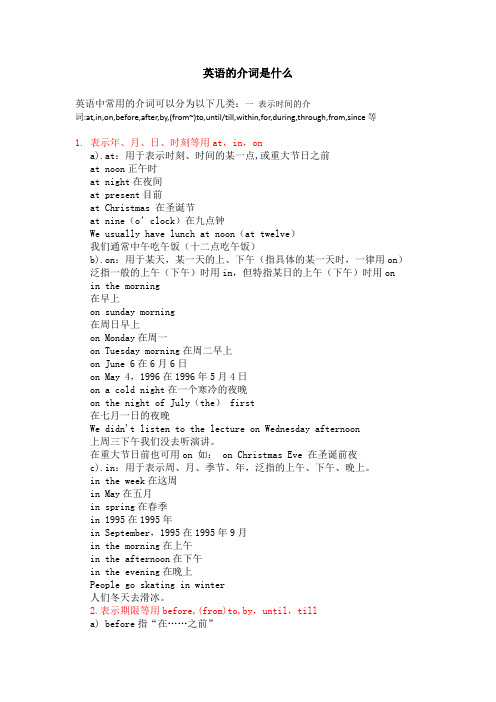
英语的介词是什么英语中常用的介词可以分为以下几类:一表示时间的介词:at,in,on,before,after,by,(from~)to,until/till,within,for,during,through,from,since等1.表示年、月、日、时刻等用at,in,ona).at:用于表示时刻、时间的某一点,或重大节日之前at noon正午时at night在夜间at present目前at Christmas 在圣诞节at nine(o’clock)在九点钟We usually have lunch at noon(at twelve)我们通常中午吃午饭(十二点吃午饭)b).on:用于某天,某一天的上、下午(指具体的某一天时,一律用on)泛指一般的上午(下午)时用in,但特指某日的上午(下午)时用on in the morning在早上on sunday morning在周日早上on Monday在周一on Tuesday morning在周二早上on June 6在6月6日on May 4,1996在1996年5月4日on a cold night在一个寒冷的夜晚on the night of July(the) first在七月一日的夜晚We didn't listen to the lecture on Wednesday afternoon上周三下午我们没去听演讲。
在重大节日前也可用on 如: on Christmas Eve 在圣诞前夜c).in:用于表示周、月、季节、年,泛指的上午、下午、晚上。
in the week在这周in May在五月in spring在春季in 1995在1995年in September,1995在1995年9月in the morning在上午in the afternoon在下午in the evening在晚上People go skating in winter人们冬天去滑冰。
时间介词on,in,at的用法

时间介词on,in,at的用法作者:赵倩岚来源:《初中生(二年级)》2003年第12期用英语表示不同的时间概念时要用不同的介词。
常用的表示时间的介词有:on,in和at。
一、on表示时间时,常用于以下几种情况:1用于表示具体的某一天及星期几。
如onMarch8th.(在3月8号),onthetenthofSeptember(在9月10日),onMonday(在星期一)。
2专指某一天的早晨、午前、午后、晚上。
如:onSundaymorning(在星期天的早晨),ontheeveningofChristmasDay(在圣诞节的晚上),onacoldafternoon(在一个寒冷的下午),onthemorningofMay1st,2002(在2002年5月1日的早晨)。
二、in表示时间时,常用于以下几种情况:1指较长的某一段时间,如在某年、在某季、在某月等等。
例如:in1997(在1997年),insummer(在夏季),inDecember(在12月),in21stCentury(在21世纪)。
2用于一天当中的各个部分。
如inthemorning/afternoon/evening(在上午/下午/晚上)。
3固定搭配。
如inthedaytime在白天,inthenight在夜里。
三、at表示时间时,常用于以下几种情况:1at常用来表示某一具体时刻,即几点钟或几时几分。
如atsixo'clock(6点),ataquarterpasteight(8点15分)。
另外,at还可用于下面的固定搭配:atsunrise(日出时),atnoon(中午),atnight(在夜晚),atmidnight(午夜),atthattime(那时),atthismoment(此刻),atthistimeofyear(一年的这个时候)等。
2at还可用于表示节日、周末时。
如:attheweekend(在周末)、atChristmas(在圣诞节)、atEaster(在复活节)。
介词in-on-at在表示时间时的用法
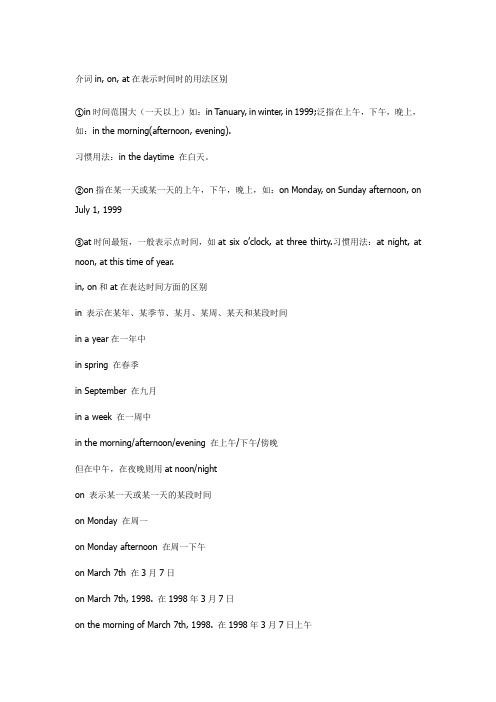
介词in, on, at在表示时间时的用法区别①in时间范围大(一天以上)如:in Tanuary, in winter, in 1999;泛指在上午,下午,晚上,如:in the morning(afternoon, evening).习惯用法:in the daytime 在白天。
②on指在某一天或某一天的上午,下午,晚上,如:on Monday, on Sunday afternoon, on July 1, 1999③at时间最短,一般表示点时间,如at six o’clock, at three thirty.习惯用法:at night, at noon, at this time of year.in, on和at在表达时间方面的区别in 表示在某年、某季节、某月、某周、某天和某段时间in a year在一年中in spring 在春季in September 在九月in a week 在一周中in the morning/afternoon/evening 在上午/下午/傍晚但在中午,在夜晚则用at noon/nighton 表示某一天或某一天的某段时间on Monday 在周一on Monday afternoon 在周一下午on March 7th 在3月7日on March 7th, 1998. 在1998年3月7日on the morning of March 7th, 1998. 在1998年3月7日上午at 表示某个具体时刻。
at eight o’clock 在8点钟at this time of the year 在一年中的这个时候at the moment 在那一时刻at that time 在那时注意:在英语中,如果时间名词前用this, last, next 等修饰时,像这样的表示,“在某时”的时间短语前,并不需要任何介词。
例如:last month, last week, this year, this week, next year, the next day, the next year 等。
2018初中英语词汇之at, in与on的用法区别

2018初中英语词汇之at, in与on的用法区别
(1) 表示时间,注意以下用法:
①表示时间的某一点、某一时刻或年龄等用at:
I get up at six in the morning. 我早上六点钟起床。
He got married at the age of 25. 他25 岁结婚。
②泛指一般意义的上午、下午或晚上以及月或年等较长的时间,一般用in:
We watch TV in the evening. 我们晚上看电视。
He went to Japan in 1946. 他于1946 去了日本。
③若表示星期几或某一特定的日期,则用on:
He left here on the fifth of May. 他于5 月5 日离开这儿。
(2) 表示地点、场所、位置等,注意以下用法:
①表示某一点位置,用at:
We live at No. 87 Beijing Road. 我们住在北京路87 号。
The hospital is at the end of the street. 医院在这条街的尽头。
与名词所有格连用表示地点,也用at。
如:
at my sisters 在我姐姐家
at the doctors 在医务室。
介词in on at在表示时间时的用法区别
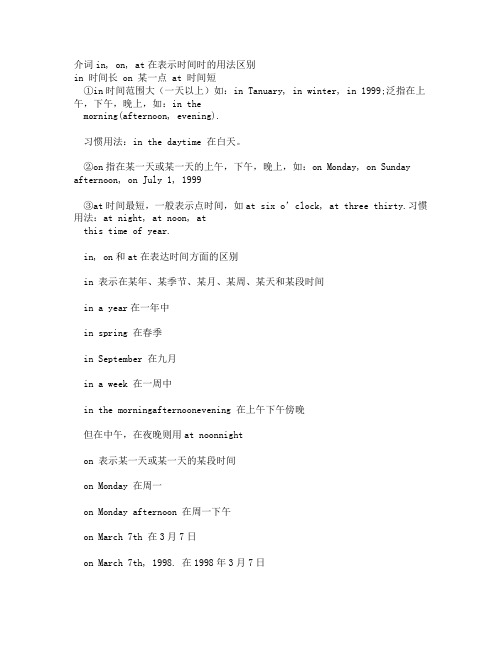
介词in, on, at在表示时间时的用法区别in 时间长 on 某一点 at 时间短①in时间范围大(一天以上)如:in Tanuary, in winter, in 1999;泛指在上午,下午,晚上,如:in themorning(afternoon, evening).习惯用法:in the daytime 在白天。
②on指在某一天或某一天的上午,下午,晚上,如:on Monday, on Sunday afternoon, on July 1, 1999③at时间最短,一般表示点时间,如at six o’clock, at three thirty.习惯用法:at night, at noon, atthis time of year.in, on和at在表达时间方面的区别in 表示在某年、某季节、某月、某周、某天和某段时间in a year在一年中in spring 在春季in September 在九月in a week 在一周中in the morningafternoonevening 在上午下午傍晚但在中午,在夜晚则用at noonnighton 表示某一天或某一天的某段时间on Monday 在周一on Monday afternoon 在周一下午on March 7th 在3月7日on March 7th, 1998. 在1998年3月7日on the morning of March 7th, 1998. 在1998年3月7日上午at 表示某个具体时刻。
at eight o’clock 在8点钟at this time of the year 在一年中的这个时候at the moment 在那一时刻at that time 在那时注意:在英语中,如果时间名词前用this, last, next 等修饰时,像这样的表示,“在某时”的时间短语前,并不需要任何介词。
例如:last month, last week, this year, this week, next year, the next day, thenext year等。
介词at,by,to,in,for,of,on,from,with的用法

at, by, to, in, for, of, on, from, with其中又以at, by, in, on为四大“要犯”!学习介词就是要抓住这几“要犯”。
有人写了一首《介词口诀》来帮助学习者;也有人写了《Preposition Song》令学习者一面唱歌一面轻松地记忆介词的用法。
同学们可以借助这个方法有针对性地记忆常用介词:1. In the summer at the seaside (季节用in, 在海边用at)On the coast we like it fine (在海岸用on)but in winter ,yes ,at Christmas (在圣诞用at)By the fireside we recline (放置) (在炉边用by)2. In July we went to Kenya (月份用in)Stayed in Lamu by the sea, (住在Lamu用in)We came back to TanzaniaThen across Victoria sea3. Did you come here in a taxi? (乘出租汽车用in)Or by bus, or on the train? (乘公共汽车用by, 乘火车用on) Did you come on foot this evening (步行用on)Or perhaps by aeroplane? (乘飞机用by)4. Will you come to tea on Monday? (在星期一用on)I′ll be home at half past three(时间三点半用at)Yes, I′ll stay for half an hour(长达半小时用for)if you buy some beer for me (给我for me)5. In the morning I drink coffee (早晨用in the morning)In the afternoon there′s tea(下午用in the afternoon)In the evening I have cocoa (傍晚用in the evening)Yes, at night ,it′s good for me.(晚上用at night)6. Where′s my pencil?In the kitchen (厨房里in the kitchen) On the table near the chair (在桌上on the table, 在椅边near the chair)Underneath the cup and saucer (在杯和碟的下面 underneath...) Just behind the teapot there (在茶壶后边behind...)7. Can you tell me how to get toMr. Johnson′s coffee-bar?Down the street and round the corner (down the street 沿着街道,round...绕过)Past the church and there you are8. Where′s the bookshop? Over there,dear (over there 那里) First turn left,then go straight on,Along the road,across the market (沿着路along the road, 穿过市场 across...)It′s in front of you, dear John(在你前面 in front of you) 9. There is nothing on the radio (广播on the radio) "Songs with orchestra" they said. (with后orchestra为有形物,无形物则用by)I′m not interested in music(interested in 兴趣于)so I think I′ll go to bed10. In a moment I′ll be finished(in a moment 片刻里) With these prepositions-so I will say to you in English till the next time, cheerio (加油呀) (till... 直到)记住这十段歌词后,你就学到许多介词用法了。
+in或on或at的区别
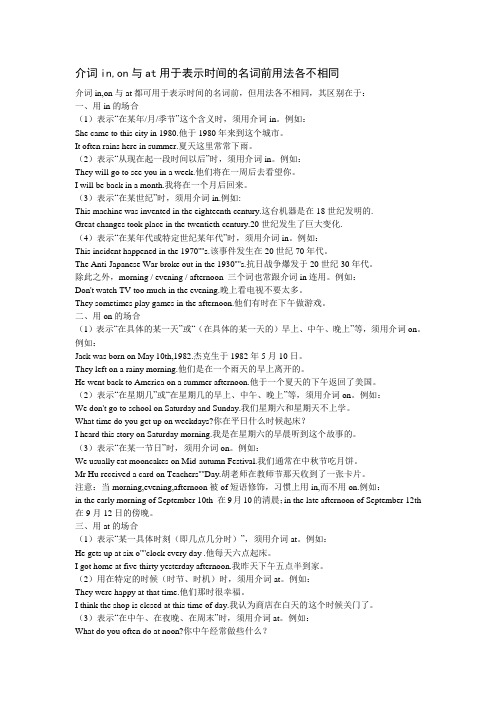
介词in,on与at用于表示时间的名词前用法各不相同介词in,on与at都可用于表示时间的名词前,但用法各不相同,其区别在于:一、用in的场合(1)表示“在某年/月/季节”这个含义时,须用介词in。
例如:She came to this city in 1980.他于1980年来到这个城市。
It often rains here in summer.夏天这里常常下雨。
(2)表示“从现在起一段时间以后”时,须用介词in。
例如:They will go to see you in a week.他们将在一周后去看望你。
I will be back in a month.我将在一个月后回来。
(3)表示“在某世纪”时,须用介词in.例如:This machine was invented in the eighteenth century.这台机器是在18世纪发明的.Great changes took place in the twentieth century.20世纪发生了巨大变化.(4)表示“在某年代或特定世纪某年代”时,须用介词in。
例如:This incident happened in the 1970''''s.该事件发生在20世纪70年代。
The Anti-Japanese War broke out in the 1930''''s.抗日战争爆发于20世纪30年代。
除此之外,morning / evening / afternoon 三个词也常跟介词in连用。
例如:Don't watch TV too much in the evening.晚上看电视不要太多。
They sometimes play games in the afternoon.他们有时在下午做游戏。
二、用on的场合(1)表示“在具体的某一天”或“(在具体的某一天的)早上、中午、晚上”等,须用介词on。
(完整版)英语中介词的用法以及动词的用法讲解
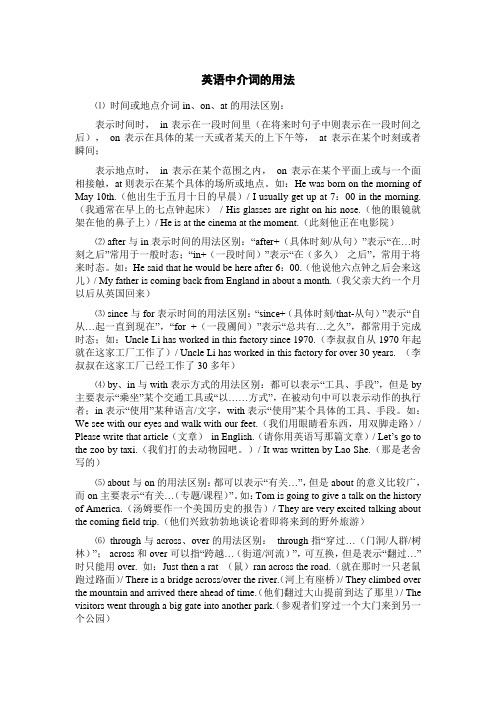
英语中介词的用法⑴时间或地点介词in、on、at的用法区别:表示时间时,in表示在一段时间里(在将来时句子中则表示在一段时间之后),on表示在具体的某一天或者某天的上下午等,at表示在某个时刻或者瞬间;表示地点时,in表示在某个范围之内,on表示在某个平面上或与一个面相接触,at则表示在某个具体的场所或地点。
如:He was born on the morning of May 10th.(他出生于五月十日的早晨)/ I usually get up at 7:00 in the morning.(我通常在早上的七点钟起床)/ His glasses are right on his nose.(他的眼镜就架在他的鼻子上)/ He is at the cinema at the moment.(此刻他正在电影院)⑵ after与in表示时间的用法区别:“after+(具体时刻/从句)”表示“在…时刻之后”常用于一般时态;“in+(一段时间)”表示“在(多久)之后”,常用于将来时态。
如:He said that he would be here after 6:00.(他说他六点钟之后会来这儿)/ My father is coming back from England in about a month.(我父亲大约一个月以后从英国回来)⑶ since与for表示时间的用法区别:“since+(具体时刻/that-从句)”表示“自从…起一直到现在”,“for +(一段斶间)”表示“总共有…之久”,都常用于完成时态;如:Uncle Li has worked in this factory since 1970.(李叔叔自从1970年起就在这家工厂工作了)/ Uncle Li has worked in this factory for over 30 years. (李叔叔在这家工厂已经工作了30多年)⑷ by、in与with表示方式的用法区别:都可以表示“工具、手段”,但是by 主要表示“乘坐”某个交通工具或“以……方式”,在被动句中可以表示动作的执行者;in表示“使用”某种语言/文字,with表示“使用”某个具体的工具、手段。
英语时间介词的用法
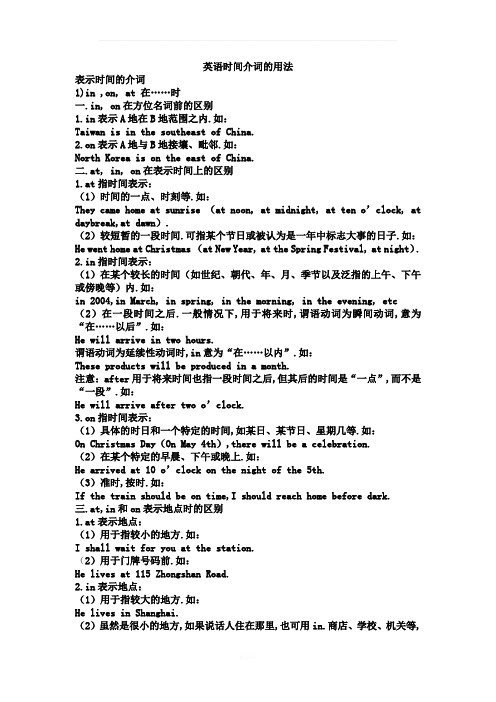
英语时间介词的用法 表示时间的介词 1)in ,on, at 在……时 一.in, on 在方位名词前的区别 1.in 表示 A 地在 B 地范围之内.如: Taiwan is in the southeast of China. 2.on 表示 A 地与 B 地接壤、毗邻.如: North Korea is on the east of China. 二.at, in, on 在表示时间上的区别 1.at 指时间表示: (1)时间的一点、时刻等.如: They came home at sunrise (at noon, at midnight, at ten o’clock, at daybreak,at dawn). (2)较短暂的一段时间.可指某个节日或被认为是一年中标志大事的日子.如: He went home at Christmas (at New Year, at the Spring Festival, at night). 2.in 指时间表示: (1)在某个较长的时间(如世纪、朝代、年、月、季节以及泛指的上午、下午 或傍晚等)内.如: in 2004,in March, in spring, in the morning, in the evening, etc (2)在一段时间之后.一般情况下,用于将来时,谓语动词为瞬间动词,意为 “在……以后”.如: He will arrive in two hours. 谓语动词为延续性动词时,in 意为“在……以内”.如: These products will be produced in a month. 注意:after 用于将来时间也指一段时间之后,但其后的时间是“一点”,而不是 “一段”.如: He will arrive after two o’clock. 3.on 指时间表示: (1)具体的时日和一个特定的时间,如某日、某节日、星期几等.如: On Christmas Day(On May 4th),there will be a celebration. (2)在某个特定的早晨、下午或晚上.如: He arrived at 10 o’clock on the night of the 5th. (3)准时,按时.如: If the train should be on time,I should reach home before dark. 三.at,in 和 on 表示地点时的区别 1.at 表示地点: (1)用于指较小的地方.如: I shall wait for you at the station. (2)用于门牌号码前.如: He lives at 115 Zhongshan Road. 2.in 表示地点: (1)用于指较大的地方.如: He lives in Shanghai. (2)虽然是很小的地方,如果说话人住在那里,也可用 in.商店、学校、机关等,
介词at, by, to, in, for, of, on, from, with的用法
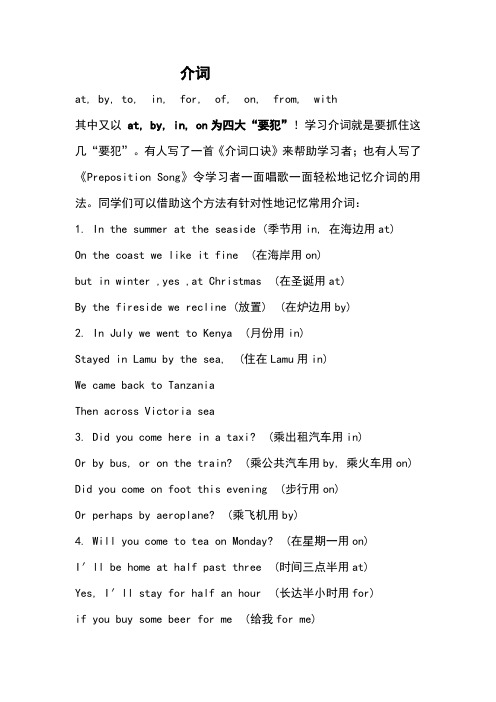
介词at, by, to, in, for, of, on, from, with其中又以at, by, in, on为四大“要犯”!学习介词就是要抓住这几“要犯”。
有人写了一首《介词口诀》来帮助学习者;也有人写了《Preposition Song》令学习者一面唱歌一面轻松地记忆介词的用法。
同学们可以借助这个方法有针对性地记忆常用介词:1. In the summer at the seaside (季节用in, 在海边用at)On the coast we like it fine (在海岸用on)but in winter ,yes ,at Christmas (在圣诞用at)By the fireside we recline (放置) (在炉边用by)2. In July we went to Kenya (月份用in)Stayed in Lamu by the sea, (住在Lamu用in)We came back to TanzaniaThen across Victoria sea3. Did you come here in a taxi? (乘出租汽车用in)Or by bus, or on the train? (乘公共汽车用by, 乘火车用on) Did you come on foot this evening (步行用on)Or perhaps by aeroplane? (乘飞机用by)4. Will you come to tea on Monday? (在星期一用on)I′ll be home at half past three(时间三点半用at)Yes, I′ll stay for half an hour (长达半小时用for)if you buy some beer for me (给我for me)5. In the morning I drink coffee (早晨用in the morning)In the afternoon there′s tea(下午用in the afternoon)In the evening I have cocoa (傍晚用in the evening)Yes, at night ,it′s good for me.(晚上用at night)6. Where′s my pencil?In the kitchen(厨房里in the kitchen) On the table near the chair (在桌上on the table, 在椅边near the chair)Underneath the cup and saucer (在杯和碟的下面 underneath...) Just behind the teapot there (在茶壶后边behind...)7. Can you tell me how to get toMr. Johnson′s coffee-bar?Down the street and round the corner (down the street 沿着街道,round...绕过)Past the church and there you are8. Where′s the bookshop? Over there,dear (over there 那里) First turn left,then go straight on,Along the road,across the market (沿着路along the road, 穿过市场 across...)It′s in front of you, dear John(在你前面 in front of you) 9. There is nothing on the radio (广播on the radio) "Songs with orchestra" they said. (with后orchestra为有形物,无形物则用by)I′m not interested in music(interested in 兴趣于)s o I think I′ll go to bed10. In a moment I′ll be finished(in a moment 片刻里) With these prepositions-so I will say to you in English till the next time, cheerio (加油呀) (till... 直到)记住这十段歌词后,你就学到许多介词用法了。
介词in,on与at都可用于表示时间的名词

介词in,on与at都可用于表示时间的名词前,但用法各不相同,其区别在于:一、用in的场合(1)表示“在某年/月/季节”这个含义时,须用介词in。
例如:She came to this city in 1980.他于1980年来到这个城市。
It often rains here in summer.夏天这里常常下雨。
(2)表示“从现在起一段时间以后”时,须用介词in。
例如:They will go to see you in a week.他们将在一周后去看望你。
I will be back in a month.我将在一个月后回来。
(3)表示“在某世纪”时,须用介词in.例如:This machine was invented in the eighteenth century.这台机器是在18世纪发明的.Great changes took place in the twentieth century.20世纪发生了巨大变化.(4)表示“在某年代或特定世纪某年代”时,须用介词in。
例如:This incident happened in the 1970''''s.该事件发生在20世纪70年代。
The Anti-Japanese War broke out in the 1930''''s.抗日战争爆发于20世纪30年代。
除此之外,morning / evening / afternoon 三个词也常跟介词in连用。
例如:Don't watch TV too much in the evening.晚上看电视不要太多。
They sometimes play games in the afternoon.他们有时在下午做游戏。
二、用on的场合(1)表示“在具体的某一天”或“(在具体的某一天的)早上、中午、晚上”等,须用介词on。
介词at, by, to, in, for, of, on, from, with的用法
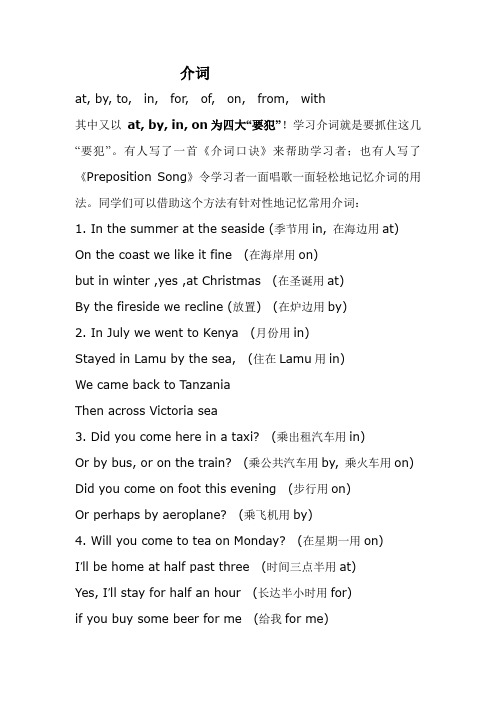
介词at, by, to,in,for,of,on,from,with其中又以at, by, in, on为四大“要犯”!学习介词就是要抓住这几“要犯”。
有人写了一首《介词口诀》来帮助学习者;也有人写了《Preposition Song》令学习者一面唱歌一面轻松地记忆介词的用法。
同学们可以借助这个方法有针对性地记忆常用介词:1. In the summer at the seaside (季节用in, 在海边用at) On the coast we like it fine(在海岸用on)but in winter ,yes ,at Christmas(在圣诞用at)By the fireside we recline (放置)(在炉边用by)2. In July we went to Kenya(月份用in)Stayed in Lamu by the sea,(住在Lamu用in)We came back to T anzaniaThen across Victoria sea3. Did you come here in a taxi?(乘出租汽车用in)Or by bus, or on the train?(乘公共汽车用by, 乘火车用on) Did you come on foot this evening(步行用on)Or perhaps by aeroplane?(乘飞机用by)4. Will you come to tea on Monday?(在星期一用on)I′ll be home at half past three(时间三点半用at)Yes, I′ll stay for half an hour(长达半小时用for)if you buy some beer for me(给我for me)5. In the morning I drink coffee(早晨用in the morning)In the afternoon there′s tea(下午用in the afternoon)In the evening I have cocoa(傍晚用in the evening) Yes, at night ,it′s good for me.(晚上用at night)6. Where′s my pencil?In the kitchen(厨房里in the kitchen) On the table near the chair(在桌上on the table, 在椅边near the chair)Underneath the cup and saucer(在杯和碟的下面underneath...)Just behind the teapot there(在茶壶后边behind...)7. Can you tell me how to get toMr. Johnson′s coffee-bar?Down the street and round the corner (down the street 沿着街道,round...绕过)Past the church and there you are8. Where′s the bookshop? Over there,dear (over there 那里) First turn left,then go straight on,Along the road,across the market(沿着路along the road, 穿过市场across...)It′s in front of you, dear John(在你前面in front of you) 9. There is nothing on the radio(广播on the radio) "Songs with orchestra" they said.(with后orchestra为有形物,无形物则用by)I′m not interested in music(interested in 兴趣于)so I think I′ll go to bed10. In a moment I′ll be finished(in a moment 片刻里) With these prepositions-so I will say to you in Englishtill the next time, cheerio (加油呀) (till... 直到)记住这十段歌词后,你就学到许多介词用法了。
介词in,on.at,for.with,by,of的基本用法

介词是英语中最活跃的词类之一。
同一个汉语词汇在英语中可译成不同的英语介词。
例如汉语中的“用”可译成:(1)用英语(in English);(2)用小刀(with a knife);(3)用手工(by hand);(4)用墨水(in ink)等。
所以,千万不要以为记住介词的一两种意思就掌握了这个介词的用法,其实介词的用法非常广泛,搭配能力很强,越是常用的介词,其含义越多。
下面就简单介绍几组近义介词的用法及其搭配方法。
一. in, to, on和off在方位名词前的区别1. in表示A地在B地范围之内。
如:Taiwan is in the southeast of China.2. to表示A地在B地范围之外,即二者之间有距离间隔。
如:Japan lies to the east of China.3. on表示A地与B地接壤、毗邻。
如:North Korea is on the east of China.4. off表示“离……一些距离或离……不远的海上”。
如:They arrived at a house off the main road.New Zealand lies off the eastern coast of Australia.二. at, in, on, by和through在表示时间上的区别1. at指时间表示:(1)时间的一点、时刻等。
如:They came home at sunrise (at noon, at midnight, at ten o’clock, at daybreak, at dawn).(2)较短暂的一段时间。
可指某个节日或被认为是一年中标志大事的日子。
如:He went home at Christmas (at New Year, at the Spring Festival, at night). 2. in指时间表示:(1)在某个较长的时间(如世纪、朝代、年、月、季节以及泛指的上午、下午或傍晚等)内。
介词in, on, at在表示时间时的用法区别
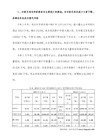
〔正〕 She hid herself behind the tree.
〔析〕 after多用来表达某动作之后,所以有的语法书中称它为动态介词,如:I run after him. After finishing my
holiday. 而for表示一段时间,可以用于完成时,如:I haven't see you for a long time. 而through
用来表示时间时则为整整,全部的时间。如:It rained through the
night.而since则是表达主句动作的起始时间,一般要与完成时连用。
in New York. After three days, I found a job in the bank. ② after
加时间是表达一个不确定的时间范围,如:after three days, 即三天之后的哪一天都可以。所以在许诺若干时间内会完成某事时,一定要用介词in。
〔误〕 Three days after he died.
〔正〕 After three days he died.
〔正〕 Three days later he died.
〔析〕 after 与 later都可以用来表达一段时间之后,但它们所处的位置不同,after 在时间词前,而later在时间词后。
in the morningafternoonevening 在上午下午傍晚
但在中午,在夜晚则用at noonnight
on 表示某一天或某一天的某段时间 y afternoon 在周一下午
on March 7th 在3月7日
介词的用法与区别举例

介词的用法与区别举例一、介词的定义和作用介词是指用来引导名词或代词与其他分句要素之间关系的一类词语。
它可以表示时间、地点、方式、原因等概念,起着连接和修饰的作用。
在英语中,有许多常见的介词,它们具有不同的用法和区别。
下面将通过举例来详细说明这些区别。
二、表示时间的介词1. At:常用于具体点位时间之前,例如at 7 o'clock(在7点钟),at midnight (在午夜)等。
2. In:通常用于较宽泛时间内,例如in January(在一月份),in the morning (在早晨)等。
3. On:用于某一具体日期或特定天,在日历上可以看到的日期,例如on Monday(在星期一),on Christmas Day(在圣诞节)等。
三、表示地点的介词1. In:表示大范围地点位置,在城市、国家或洲际层面,例如in Paris(在巴黎),in China(在中国),in Europe(在欧洲)等。
2. At:表示小范围或精确地点位置,在建筑物、具体场所等处,例如at school (在学校),at the cinema(在电影院)等。
3. On:表示在某个平面或表面的位置,例如on the table(在桌子上),on the wall(在墙上)等。
四、表示方式和原因的介词1. By:表示通过一种手段、工具或方法来实现某事,例如by bus(乘公交车),by email(通过电子邮件)等。
2. With:表达陪同、伴随或具备某种特征,例如with my friends(和我的朋友们一起),with a smile(带着微笑)等。
3. For:表示目的、理由或为了某事/人而做某事,例如for fun(为了好玩),for her birthday(为了她的生日)等。
五、常见难点介词及区别1. At, in, on 的用法区别:- At 通常用于具体时间点,in用于较长时间范围内,on用于日期、星期几等。
at on in 跟时间的用法

at on in 跟时间的用法
在表示时间的用法中,我们使用 at、on、in 来指示不同的时间概念。
下面是它们的用法:
1. "at" 表示具体的时间点或某个特定的时刻。
例如:
- I have a meeting at 9 o'clock.(我有一个会议在九点。
)- She usually goes to bed at midnight.(她通常在午夜睡觉。
)
2. "on" 主要用于日期、星期几和节日等特定的日子。
例如:
- My birthday is on August 10th.(我的生日是在8月10日。
)
- We always have a family gathering on Christmas Day.(我们总是在圣诞节这一天举行家庭聚会。
)
3. "in" 用于表示一个时间段、月份、季节或年份等。
例如:
- I will go on vacation in July.(我将在七月去度假。
)- The flowers bloom in spring.(花朵在春天开放。
)
- He was born in 1990.(他出生于1990年。
)
需要注意的是,具体使用哪个词取决于所表达的时间概念,因此在具体场景中,可能需要根据语境来确定使用哪个词。
⑴时间或地点介词in、on、at的用法区别:表示时间时,in表示在一段...

⑴时间或地点介词in、on、at的用法区别:表示时间时, in表示在一段时间里(在将来时句子中则表示在一段时间之后), on表示在具体的某一天或者某天的上下午等, at表示在某个时刻或者瞬间;表示地点时, in表示在某个范围之内, on表示在某个平面上或与一个面相接触,at则表示在某个具体的场所或地点。
如:He was born on the morning of May 10th.(他出生于五月十日的早晨)/ I usually get up at 7:00 in the morning.(我通常在早上的七点钟起床) / His glasses are right on his nose.(他的眼镜就架在他的鼻子上)/ He is at the cinema at the moment.(此刻他正在电影院)⑵after与in表示时间的用法区别:“after+(具体时刻/从句)”表示“在…时刻之后”常用于一般时态;“in+(一段时间)”表示“在(多久) 之后”,常用于将来时态。
如:He said that he would be here after 6:00.(他说他六点钟之后会来这儿)/ My father is coming back from England in about a month.(我父亲大约一个月以后从英国回来)⑶since与for表示时间的用法区别:“since+(具体时刻/that-从句)”表示“自从…起一直到现在”,“for +(一段斶间)”表示“总共有…之久”,都常用于完成时态;如:Uncle Li has worked in this factory since 1970.(李叔叔自从1970年起就在这家工厂工作了)/ Uncle Li has worked in this factory for over 30 years. (李叔叔在这家工厂已经工作了30多年)⑷by、in与with表示方式的用法区别:都可以表示“工具、手段”,但是by主要表示“乘坐”某个交通工具或“以……方式”,在被动句中可以表示动作的执行者;in表示“使用”某种语言/文字,with表示“使用”某个具体的工具、手段。
on,in,at的用法区别口诀

on,in,at的用法区别口诀at用在时刻前,亦与正午、午夜连,黎明、终止和开端,at 与之紧接着相伴。
周月季年长时间,in须放在其前面,泛指一晌和傍晚,也要放在in后边。
on指特定某一天,日期、星期和节日前某天上下和夜晚,依然要在on后站。
on,in,at的用法区别口诀 1第一,介词in,on,at表示时间时的用法区别:in时间长,on 某一点,at时间短。
1、in时间范围大(一天以上)如:in Tanuary, in winter, in 1999;泛指在上午,下午,晚上,如:in themorning(afternoon, evening).2、on指在某一天或某一天的上午,下午,晚上。
如:on Monday, on Sunday afternoon, on July 1, 19993、at时间最短,一般表示点时间,如at six o’clock, at three thirty。
习惯用法:at night, at noon, at this time of year.第二,介词in,on,at表示地点时的用法区别:at强调点,on 强调面,in强调在里面。
1、at指具体的地方用于指较小的地方。
如:I shall wait for you at the station.用于门牌号码前。
如:He lives at 115 Zhongshan Road.2、on,一般指比较具体的街道,在...上面如:You may know that President Obama livesonPennsylvania AvenueinWashington, D.C.3、in指的地方最大,用于指较大的地方如:He lives in Shanghai.For the best food, try the restaurantsinChinatown.虽然是很小的地方,如果说话人住在那里,也可用in。
商店、学校、机关等,若看作一个地点(point)用at,若看作一个场所(place)用in。
- 1、下载文档前请自行甄别文档内容的完整性,平台不提供额外的编辑、内容补充、找答案等附加服务。
- 2、"仅部分预览"的文档,不可在线预览部分如存在完整性等问题,可反馈申请退款(可完整预览的文档不适用该条件!)。
- 3、如文档侵犯您的权益,请联系客服反馈,我们会尽快为您处理(人工客服工作时间:9:00-18:30)。
He will arrive after two o’clock.
• 3. on指时间表示: (1)具体的时日和一个特定的时间,如某 日、某节日、星期几等。如: On Christmas Day(On May 4th), there
He went home at Christmas (at New Year, at the Spring Festival, at night).
• 2. in指时间表示: (1)在某个较长的时间(如世纪、朝代、年、月、 季节以及泛指的上午、下午或傍晚等)内。如:
in 2004, in March, in spring, in the morning, in the evening, etc (2)在一段时间之后。一般情况下,用于将来时, 谓语动词为瞬间动词,意为“在……以后”。如: He will arrive in two hours. 谓语动词为延续性动词时. by指时间表示: (1)不迟于,在(某时)前。如: He will come by six o’clock. Jack had made some friends by the time you came. (2)在……间,在……的时候。如: He worked by day and slept by night.
• 5. through指时间意为“从……开始到 结束”,此时与throughout相同。如:
We work hard all through the year.
at, on, in, by在表时间时的区别
• 1. at指时间表示: (1)时间的一点、时刻等。如: They came home at sunrise (at noon, at
midnight, at ten o’clock, at daybreak, at dawn). (2)较短暂的一段时间。可指某个节日或 被认为是一年中标志大事的日子。如:
will be a celebration. (2)在某个特定的早晨、下午或晚上。如:
He arrived at 10 o’clock on the night of the
5th. (3)准时,按时。如:
If the train should be on time, I should
reach home before dark.
